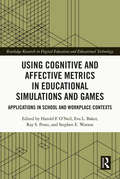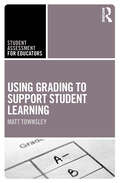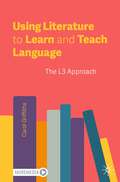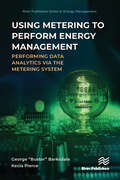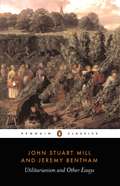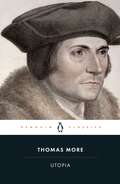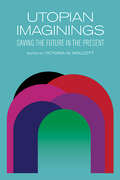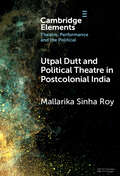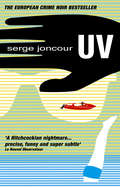- Table View
- List View
USikhukhukazi uqiliga uKhozi
by Nathan Higenyi TRANSLATED BY Pumla Mdontswa and Zanele ZumaIsizulu – First Paragraphs
Using Cognitive and Affective Metrics in Educational Simulations and Games: Applications in School and Workplace Contexts (Routledge Research in Digital Education and Educational Technology)
by Harold F. O'NeilPresenting original studies and rich conceptual analyses, this volume explores how cognitive and affective metrics can be used to effectively assess, modify, and enhance learning and assessment outcomes of simulations and games used in education and training.The volume responds to the increasing use of computer-based simulations and games across academic and professional sectors by bringing together contributions from different research communities, including K-12 and postsecondary education, medical, and military contexts. Drawing on empirical results, the chapter authors focus on the design and assessment of educational simulations and games. They describe how quantitative and qualitative metrics can be used effectively to evaluate and tailor instructional resources to the cognitive and affective needs of the individual learner. In doing so, the volume enhances understanding of how games and simulations can intersect with the science of learning to improve educational outcomes. Given its rigorous and multidisciplinary approach, this book will prove an indispensable resource for researchers and scholars in the fields of educational assessment and evaluation, educational technology, military psychology, and educational psychology.
Using Grading to Support Student Learning (Student Assessment for Educators)
by Matt TownsleyUsing Grading to Support Student Learning offers an accessible foundation for using grading practices to support student learning through classroom assessment. Purposeful, defensible grading and reporting mechanisms cannot be neglected in today’s reform climate, and new approaches are needed to understand and refine the roles of homework, formative and summative assessments, and standards across grade levels. Evidence-based and full of illustrative examples, this book bridges research and theory on grading and assessment with classroom practices for pre-service and in-service teachers and fresh perspectives for educational researchers studying grading practices.
Using Literature to Learn and Teach Language: The L3 Approach
by Carol GriffithsThis accessibly-written textbook uses the intrinsic appeal of a story to engage students with language, and provides teachers with the background knowledge and the skills to use literature to construct lessons for their classes which integrate all four skills plus language awareness in an enjoyable way. Although a number of books and studies have examined the value of using literature to learn language, literature remains under-represented as a language learning resource. The author argues that the accumulated body of literature represents a bottomless pit of potential material, just waiting to be recognised and enjoyed. From a teacher’s point of view, a lesson based on a literary work can provide an integrated approach to language development which few other approaches can match. A piece of literature can be used to develop all four skills, both receptive and productive (reading, writing, listening speaking) as well as production skills and language awareness. This book willbe an essential resource for pre-service and in-service teachers, teacher trainers, students and scholars of Applied Linguistics, Language Education, TESOL and related subjects.
Using Metering to Perform Energy Management: Performing Data Analytics via the Metering System (River Publishers Series in Energy Management)
by George “Buster” Barksdale Kecia PierceThis book covers many helpful analysis tools and processes to assist energy managers (EMs) administer their energy program through their meter management system (MMS). These tools and the corresponding techniques offer opportunities for the EM to optimize their time. If fully utilized, the MMS will allow an EM to reduce field time significantly, as they can perform most of the energy management pre-analysis, benchmarking, data analysis and, in many cases, complete the task of performing a virtual audit remotely from their office.The book covers many instructional areas that are, for the most part, only offered by consulting groups and software vendors as services. Those two groups offer their services for fees and therefore do not publish their ideas or best practices for commercial use. Software vendors provide software analytics whose functional aspects are addressed by our descriptions of the essential tasks in each chapter. This book allows EMs to expand their knowledge of software capabilities by viewing other best practices. Consulting groups offer services in a few areas: basic benchmarking and monitoring-based commissioning (MBCx). These services are considered essential to energy management but are generally implemented as on-site services, which, due to their nature, are much more expensive than a monitoring commissioning (MCx) solution. Monitoring commissioning, in contrast to MBCx, is purely done at the monitoring level and allows you to manage the critical energy measures that comprise the majority of the savings, but without getting into the field testing.Benchmarking is covered much deeper in the book as we show how to benchmark each system within a building. The benchmarking sections show how to automatically analyze each system’s usage into a separate benchmark for baseload, lighting, AC, and fan/pump systems. These systems produce benchmarks so EMs can compare by site, category type, climate zone, etc. We also introduce benchmarks that enable the EM to utilize tools to determine the performance of each system and which are their most significant energy users. These analytics functions are covered to produce results that identify potential energy savings for each energy system.
UsiRhwerhwe usinda ekufen
by Selolo Nare Joyce TRANSLATED BY Sponono MahlanguIsindebele – First Paragraphs
Usozimfihlo
by Linda Liphondo and Sbusiso Boikanyo TRANSLATED BY Zanele ZumaIsizulu – First Paragraphs
UTamara ungena esikoleni
by Soila Murianka TRANSLATED BY Zanele Ndlovu and Zanele ZumaIsizulu – First Paragraphs
Uthaqa wezwe emaphandleni
by African Storybook TRANSLATED BY Zanele NdlovuIsizulu – First Paragraphs
UThisha uMthetho uchaza ngesandulela ngculazi
by Ntombifuthi Ncwayiba TRANSLATED BY Zanele NdlovuIsizulu – First Paragraphs
Utilitarianism and Other Essays
by Jeremy Bentham John Stuart MillOne of the most important nineteenth-century schools of thought, Utilitarianism propounds the view that the value or rightness of an action rests in how well it promotes the welfare of those affected by it, aiming for 'the greatest happiness of the greatest number'. Jeremy Bentham (1748-1832) was the movement's founder, as much a social reformer as a philosopher. His greatest interpreter, John Stuart Mill (1806-73), set out to humanize Bentham's pragmatic Utilitarianism by balancing the claims of reason and the imagination, individuality and social well-being in essays such as 'Bentham', 'Coleridge' and, above all, Utilitarianism. The works by Bentham and Mill collected in this volume show the creation and development of a system of ethics that has had an enduring influence on moral philosophy and legislative policy.
Utopia
by Thomas More'It remains astonishingly radical ... one of Utopia's most striking aspects is its contemporaniety' Terry EagletonIn Utopia, Thomas More gives us a traveller's account of a newly-discovered island where the inhabitants enjoy a social order based on natural reason and justice, and human fulfilment is open to all. As the traveller describes the island, a bitter contrast is drawn between this rational society and the practices of Europe. How can the philosopher reform his society? In his discussion, More takes up a question first raised by Plato and which is still a challenge in the contemporary world. In the history of political thought few works have been more influential than Utopia, and few more misunderstood.Translated and introduced by Dominic Baker-Smith
Utopian Imaginings: Saving the Future in the Present (SUNY series, Humanities to the Rescue)
by Victoria W. Wolcott"Sometimes that's all it takes to save a world, you see. A new vision. A new way of thinking, appearing at just the right time." These words were spoken by a fictional character in N. K. Jemisin's 2019 utopian novella Emergency Skin. But the idea of saving the world through utopian imaginings has a deep and profound history. At this moment of rupture—with the related crises of the pandemic, racial uprisings, and climate change converging—Utopian Imaginings revisits this history to show how utopian thought and practice offer alternative paths to the future. The third book in the Humanities to the Rescue series, the volume examines both lived and imagined utopian communities from an interdisciplinary perspective. While attentive to the troubled and troubling elements of different spaces and collectives, Utopian Imaginings remains premised in hope, culminating in a series of inspiring exemplars of the utopian potential of the college classroom today.
Utpal Dutt and Political Theatre in Postcolonial India (Elements in Theatre, Performance and the Political)
by null Mallarika Sinha RoyAmong the most significant playwrights and theatre-makers of postcolonial India, Utpal Dutt (1929–1993), was an early exponent of rethinking colonial history through political theatre. Dutt envisaged political theatre as part of the larger Marxist project, and his incorporation of new developments in Marxist thinking, including the contributions of Antonio Gramsci, makes it possible to conceptualise his protagonists as insurgent subalterns. A decolonial approach to staging history remained a significant element in Dutt's artistic project. This Element examines Dutt's passionate engagement with Marxism and explores how this sense of urgency was actioned through the writing and producing of plays about the peasant revolts and armed anti-colonial movements which took place during the period of British rule. Drawing on contemporary debates in political theatre regarding the autonomy of the spectator and the performance of history, the author locates Dutt's political theatre in a historical frame.
UTsheketshe usindisa uJuba
by Kholeka Mabeta and Judith Baker ADAPTED BY Pumla Mdontswa and Zanele ZumaIsizulu – First Paragraphs
UV
by Serge JoncourWinner of the Prix Roman France TélévisionsOn a hot and lazy sun-drenched afternoon, when one affluent family are at their most docile, most vulnerable, most ripe for the picking, a handsome stranger unexpectedly turns up, and lingers poolside. A master of the art of deception, Boris introduces himself as an old school friend of Philip, the feckless brother. No matter that Philip has been unreachable for days and yet to arrive for the summer holiday, Boris is welcomed with open arms. As the island's spectacular Bastille Day fireworks celebration looks ever nearer, and Philip's arrival feels increasingly imminent, Boris is embraced wholeheartedly into the family fold. No one seems to notice as he carefully exerts a powerful and sinister influence over them all...

